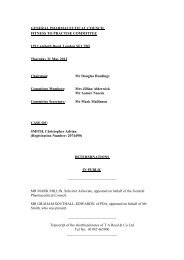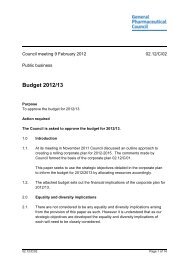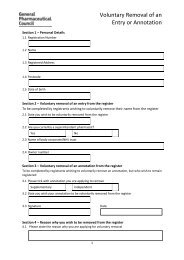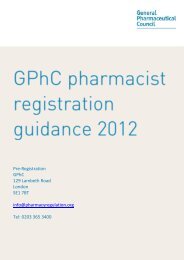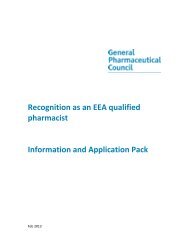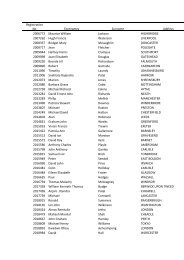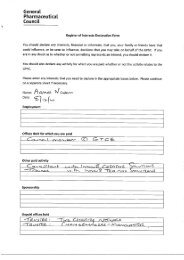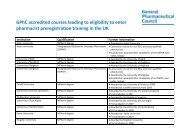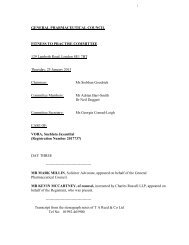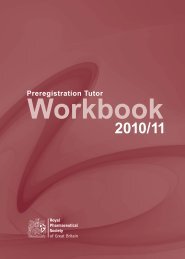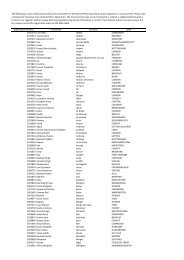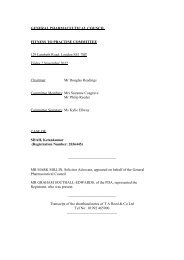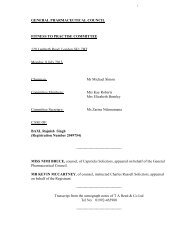Determination - General Pharmaceutical Council
Determination - General Pharmaceutical Council
Determination - General Pharmaceutical Council
You also want an ePaper? Increase the reach of your titles
YUMPU automatically turns print PDFs into web optimized ePapers that Google loves.
2DETERMINATION OF THE COMMITTEE AS REGARDS SERVICE OF NOTICE OFHEARING AND PROCEEDING IN ABSENCETHE CHAIRMAN: This is a principal hearing concerning the Registrant Miss AukseAustinskaite and the issue is, whether by reason of a number of allegations which havebeen made against her, her fitness to practise is impaired. The Registrant has not appearedand, accordingly, there are two matters which we have had to consider; firstly whether theRegistrant has received notice of hearing and, secondly, whether, if she has, we shouldproceed in her absence.As regards service of notice, the notice of hearing dated 27 February of 2012 was, we aresatisfied, sent to the address on her registration form by post and to the e-mail address thatthe <strong>Council</strong> had for her. We are satisfied that she received that notice. That arises from thedocument that she returned to the <strong>Council</strong> in which she ticked the boxes that she would notbe attending the hearing. She acknowledged receipt of the notice and she signed and datedthe document.However, a problem arises in relation to what was attached to that document, namely theParticulars of Allegation which were going to be the subject matter of the hearing. TheParticulars of Allegation appended to the notice contained seven paragraphs and it hasemerged that these were the allegations which were the subject matter of the hearing beforethe Investigating Committee. The Investigating Committee decided to refer the matter tothis Committee. The Particulars of Allegation as habitually happens were then redraftedand the the resulting version was materially different from the Particulars of Allegation
5There follows in Rose L.J.’s guidance a very important overarching principle to the effectthat, although this Committee has a discretion as to whether the hearing should take placein the absence of the registrant, that discretion should be exercised with great care, and it isonly in rare and exceptional cases that it should be exercised in favour of the hearing takingplace or continuing, particularly if the respondent is unrepresented.Then in sub-paragraph (5) Rose LJ lists a number of matters that should be considered. Inour assessment the most important is whether the respondent has indicated an intention notto attend and has thereby waived his or her right to appear at the hearing. In this particularinstance Miss Austinskaite has ticked boxes which appear in the Notice of Hearing whichindicate that she will not attend the hearing and that she would not be represented at thehearing. In addition to that, she has informed the <strong>Council</strong> that she is no longer in Englandor (by implication) in Scotland where she was living at the time that she was practising,and that she is now abroad. It seems that she now lives in Spain, if not in Lithuania, whichis her country of origin. She has not made any application for the matter to be adjourned.She has not expressed any intention to attend if the case was adjourned to a date at whichshe would be able to attend.In those circumstances, it is quite clear that an adjournment would not result in therespondent attending. It seems to us that it is therefore in the public interest that this matteris resolved here and now because an adjournment would serve no purpose. Accordinglywe consider applying the guidance given in the case that I have mentioned, that it is rightand proper, fair and just, to proceed in the absence of the respondent.
6GENERAL PHARMACEUTICAL COUNCILFITNESS TO PRACTISE COMMITTEE129 Lambeth Road, London SE1 7BTMonday, 16 April 2012Chairman:Committee members:Mr Patrick Milmo QCMr Peter JonesMrs Kathryn DouglasCommittee Secretary:Miss Georgia Conrad-LeighCASE OF:AUSTINSKAITE, Aukse(Registration Number 2071786)-------------------------------------MISS NIRUPAR UDDIN, appeared on behalf of the <strong>General</strong> <strong>Pharmaceutical</strong> <strong>Council</strong>.MISS AUKSE AUSTINSKAITE was not present and was not represented.-------------------------------------Transcript from the stenograph notes of T A Reed & Co LtdTel No: 01992-465900-------------------------------------
8At the beginning of April 2010 the Registrant resigned from Morrisons and, shortly after,obtained employment with Boots in Scotland, although she did not start work for Bootsuntil June 2010. Allegations 6 to 10 are concerned with the Registrant's time at Bootsbetween June 2010 and May 2011.During this time there were a series of dispensing errors committed by the Registrant, andthere were various efforts which were made to improve her performance, which was clearlynot regarded as up to the standard required. Accordingly, on 3 July 2010, she was thesubject of a Performance Development Plan. About month later, on 13 August 2010, shewas placed on a Performance Improvement Plan because of concerns regarding herperformance. Then on about 14 April 2011 the Registrant was placed on the second stageof the Performance Improvement Plan and invited to what is called a Stage 2 PerformanceImprovement Meeting because her performance standards had not moved forward to anacceptable level for patient safety. As I have said, there were also a number of dispensingerrors separately recorded occurring between July 2010 and 31 March 2011, the numberbeing 16.Her record at Boots during this period has been covered by the evidence of Miss Sterlingwho read out her detailed witness statement by video and referred to a number ofdocuments. On the basis of that evidence, regardless of the admissions which have beenmade by the Registrant, we find the allegations set out in paragraphs 7, 8, 9 and 10 to havebeen proved. Allegation 6 again is what can be described as a prefatory neutral allegation,merely recording the period of her employment as a pharmacist at Boots.Those are our findings of fact, and all that it is necessary to state at this stage.
9GENERAL PHARMACEUTICAL COUNCILFITNESS TO PRACTISE COMMITTEE129 Lambeth Road, London SE1 7BTTuesday, 17 April 2012Chairman:Committee members:Mr Patrick Milmo QCMr Peter JonesMrs Kathryn DouglasCommittee Secretary:Miss Georgia Conrad-LeighCASE OF:AUSTINSKAITE, Aukse(Registration Number 2071786)DAY TWO-------------------------------------MISS NIRUPAR UDDIN, appeared on behalf of the <strong>General</strong> <strong>Pharmaceutical</strong> <strong>Council</strong>.MISS AUKSE AUSTINSKAITE was not present and was not represented.-------------------------------------Transcript from the stenograph notes of T A Reed & Co LtdTel No: 01992-465900-------------------------------------
10DETERMINATION OF THE COMMITTEE ON IMPAIRMENTTHE CHAIRMAN: The Committee have found all the Particulars of Allegation proved byevidence. They have also been admitted by the Registrant in e-mails that she has sent tothe <strong>Council</strong>. On the basis of the facts comprised in the Particulars of Allegation, the<strong>Council</strong> contend that the Registrant's fitness to practise is impaired on the alternativegrounds of deficient professional performance or misconduct.I should mention that, in one of the recent e-mails to which I have already referred, theRegistrant has also admitted impairment. However, impairment is a matter of judgment notof fact, and we must reach our own independent conclusions regardless of admissionsmade by the Registrant.Article 51 of the Pharmacy Order 2010 lists the grounds which may give rise toimpairment. First in the list is misconduct; second is deficient professional performance.However, it has been made clear in a case called Vali v <strong>General</strong> Optical <strong>Council</strong>, a decisionof Ouseley J in the Administrative Court on 14 January 2011, that where charges ofmisconduct and deficient professional performance are founded on the same facts, then theCommittee can only find impairment on one of these grounds, not on both. In Vali, thejudge stated at paragraph 30 that the Committee was wrong to find that the conduct of theRegistrant was deficient professional performance because it had found that it wasmisconduct, and said:"It is necessary to keep, so far as possible, some distinction between the two. Iaccept that what happened here could have been found to be deficient professionalperformance, but it would in those circumstances have been wrong simply to founda misconduct charge proved."
11The converse must also be true, namely that it would be wrong to find misconduct if thereis a finding of deficient professional performance. The <strong>Council</strong>, through Miss Uddin whopresented the <strong>Council</strong>'s case, primarily base their case on deficient professionalperformance, and she only invites us to consider misconduct if we are unable to concludethat the facts found amount to deficient professional performance.I now turn to the Particulars of Allegation. The ten particulars cover two periods of theRegistrant's practice as a pharmacist in the UK. 1 to 5 are concerned with the Registrant'semployment at Morrisons between 28 September 2009 and 12 April 2010. Allegations 6 to10 are concerned with the Registrant's employment at Boots between June 2010 and 20May 2011. It has to be said that we consider that a number of the allegations areinappropriately formulated in that, instead of setting out the actions or omissions of theRegistrant which give rise to the deficient professional performance, they refer to theactions of the Registrant's employer in seeking to remedy the defects or to improve theRegistrant's performance. This particularly applies to the allegations concerning theRegistrant's time at Boots.Allegation 7 refers to the Registrant being set a Performance Development Plan. Itemerges that every employee is at some stage set a Performance Development Plan.Allegation 8 refers to the placement of the Registrant on the Performance ImprovementPlan, and expresses the concern of Boots regarding the performance of the Registrant inthree respects. However, there is no specific allegation of inadequate or incompetentperformance. The concerns are expressed with conspicuous vagueness and generally lackclarity.Allegation 9 refers to the Registrant being placed on the second stage of the Performance
12Improvement Plan, and an invitation to a stage 2 Performance Improvement Meeting, andcontinues "because your performance standards had not moved forward to an acceptablelevel of patient safety".Again a lack of clarity and precision as to the respects in which theperformance standards were not at an acceptable level.We will return to the initial allegations concerning the Registrant's time at Morrisons. Hereallegations 2 and 3 cite the Registrant's failure to pass an internal test or assessment carriedout as part of a conversion programme for overseas pharmacists, which the Registrant wasundertaking but there is not identified or specified the respects in which the Registrantfailed. Allegation 4 alleges that certain areas of the Registrant's practice were 'of concern'.Again, we feel that is a very vague description and no particularity is given as to theinadequacies of the Registrant's performance in these areas of practice.Allegation 5 however cites ‘near miss errors’, and they are described with precision in aschedule which is at page 7 of the bundle. To cite some of these errors, there was a wrongquantity dispensed of the controlled drug Zomorph. A drug called Ropinirol was dispensedin tablets ten times the strength of the prescription; and in respect of Frusemide, 28 tabletswere prescribed and 112 tablets were dispensed. These were undoubtedly seriousdispensing errors.We now move on to the allegations concerning the Registrant’s time at Boots. We havealready commented upon the way in which the allegations are formulated. There wasevidence put before us, both orally and in documents, of what prompted the Registrant'splacement on a Performance Improvement Plan, as well as evidence of adverse feedbackabout the Registrant's performance from various pharmacies where she had been working.However, these were not the subject of specific allegations, and we harbour doubts aboutthe extent to which we can properly take these matters into account, particularly in the
13absence of the Registrant.However, the allegation of precision and substance is allegation 10 which concerns 16dispensing errors between 6 July 2010 and 31 March 2011 which are detailed in schedule2, appended to the allegations at page 8 in the bundle of documents. Three of those errorsconcerned Methadone, a controlled drug. There was the dispensing of completely thewrong drug Hydroxyzine (with is an histamine) instead of Hydralazine (which is a drug forreducing blood pressure) and such an error could have serious consequences for the patient.There were drugs which were dispensed in the wrong quantity, and there was oneprescription for capsules with an inhaler where the capsules were supplied but not theinhaler, and therefore the drugs supplied could not be used.Looking at the schedule as a whole, many of these dispensing errors must be regarded asserious. We also mention that it is clear from surrounding evidence that the schedule didnot comprise the totality of the dispensing errors committed by the Registrant during hertime at Boots.Deficient professional performance has been defined in a case called Caelham v <strong>General</strong>Medical <strong>Council</strong> [2007] EWHC 2606 by Jackson J. in these terms:"It connotes a standard of professional performance which is unacceptably low andwhich (save in exceptional circumstances) has been demonstrated by reference to afair sample of the (pharmacists) work."We are quite satisfied that, on the basis of the allegations in paragraphs 5 and 10 alone ofthe Particulars of Allegation, there has been deficient professional performance by thisRegistrant. As that is our conclusion, we will not consider the alternative grounds of
14impairment, namely misconduct.Now it is not every instance of deficient professional performance which will necessarilygive rise to impairment. We must apply the fitness to practise criteria which were originallyformulated by Smith J in the Shipman inquiry, and thereafter generally accepted by thecourts, and which have now been codified it might be said in the Fitness to Practise Rules2010. Rule 5(2) provides as follows:"In relation to evidence about the conduct or behaviour of the Registrant, whichmight cast doubt on whether the requirement of fitness to practise are met inrelation to the Registrant, the Committee must have regard to whether or not thatconduct or behaviour -(a) presents an actual or potential risk to patients or to the public;(b) has brought or might bring the profession of pharmacy into disrepute;(c) has breached one of the fundamental principles of the profession of pharmacy,or(d) shows that the integrity of the Registrant can no longer be relied upon."In our view, the deficient professional performance of the Registrant in this case engages(a) and (b). The Registrant clearly has shown that she presents an actual risk to patientsand, such has been the frequency and the gravity of the dispensing errors, that she mightwell bring the profession of pharmacy into disrepute.
15However, our task is to determine not whether at some time in the past the Registrant'sfitness to practise was impaired, but whether it is currently impaired. That involvesconsideration, whatever the disposition or conduct of the Registrant giving rise to potentialimpairment may have been whether the position has been remedied so that we can decideat the present time the fitness to practise of the Registrant is not impaired.The concept of remediability is applicable to cases where impairment might arise fromdeficient professional performance caused by a consistent tendency to make dispensingerrors. This was referred to in the judgment of Sales J. in the case of Yeong concerning adoctor. The Judge said that a fitness to practise panel is required to look forward ratherthan backward, and that a finding of misconduct in the past does not necessarily mean thatthere is a impairment of fitness to practise in looking forward, and the panel is required totake account of such matters as the insight of the practitioner to the source of hismisconduct, and any remedial steps which had been taken, and the risk of recurrence ofsuch misconduct. The judge implicitly approved a submission which had been made that,where there is misconduct by a doctor in the form of clinical errors and incompetence, thequestion of remedial action taken by doctor to address his areas of weakness may be highlyrelevant to the question of whether that doctor's fitness to practise is currently impaired.In this case, however, we have no evidence that the Registrant has taken any steps toremedy her deficiencies; still less do we have any reports which will enable us to state withconfidence that she can and will fulfil in the future the high standards required of apharmacist to ensure the safety of the public and to maintain the reputation of theprofession. Nor is there any evidence which gives us any indication that the Registrantrecognised the serious consequences of her many deficiencies in the course of practice, andthe potential harm to patients by her inability to practice at the level of competencerequired of a registered pharmacist. All we know is that the Registrant, when leaving
16Boots in May 2011, expressed and intention to return to Lithuania, and that she is presentlyliving in Spain.In those circumstances, our conclusion must be that her fitness to practise is currentlyimpaired.-------------------------------
17GENERAL PHARMACEUTICAL COUNCILFITNESS TO PRACTISE COMMITTEE129 Lambeth Road, London SE1 7BTTuesday, 17 April 2012Chairman:Committee members:Mr Patrick Milmo QCMr Peter JonesMrs Kathryn DouglasCommittee Secretary:Miss Georgia Conrad-LeighCASE OF:AUSTINSKAITE, Aukse(Registration Number 2071786)DAY TWO-------------------------------------MISS NIRUPAR UDDIN, appeared on behalf of the <strong>General</strong> <strong>Pharmaceutical</strong> <strong>Council</strong>.MISS AUKSE AUSTINSKAITE was not present and was not represented.-------------------------------------Transcript from the stenograph notes of T A Reed & Co LtdTel No: 01992-465900-------------------------------------
18DETERMINATION OF THE COMMITTEE ON SANCTIONTHE CHAIRMAN: The Committee, having found that the Registrant's (Miss AukseAustinskaite's) fitness to practise is impaired by reason of deficient professionalperformance, has had to determine the appropriate sanction.The Registrant's country of origin is Lithuania, and that is where she qualified as apharmacist. She registered as a pharmacist with the Royal <strong>Pharmaceutical</strong> Society inSeptember of 2009 under the European Union Rules relating to mutual recognition byMember States of each country’s professional qualifications. We do not know whether andto what extent, if at all, the Registrant practised pharmacy in Lithuania. Her practice as apharmacist in this country has been of fairy brief duration.She joined Morrisons shortly after registration and undertook what Morrisons described asa Pharmacist Conversion Trainee Programme which Morrisons run for overseaspharmacists wanting to practice in the UK, presumably with Morrisons. She did not dovery well, failing two internal assessments conducted by Morrisons and raising concernsabout several areas of practice, including the extent of her pharmaceutical knowledge, herability to dispense accurately, to read prescriptions and to communicate in English. Sheresigned from Morrisons in April 2010 and a couple of months later was taken on byBoots, who used her as a relief pharmacist in various stores in Ayrshire and Glasgow.Almost immediately, her level of performance gave rise to concern and pharmacies werereporting unfavourably about her competence, about the risk to patient safety she wascausing, about errors in dispensing, communication problems and the lack of confidence inher ability the practice without error on her own. Various endeavours were made by wayof internal development and improvement plans to remedy her deficiencies but, during her
19time at Boots, she never achieved the standard of performance required to ensure that shecould work at a consistent level of competence so that patients for whom she wasdispensing would never be at risk. She left Boots in May 2011 and, so far as is known, shereturned to Lithuania and has not practised pharmacy since, although she had not been ableto practice in the UK as we have been told after we announced our decision on impairment,that she has been subject of an interim suspension order.Our conclusion that the Registrant's fitness to practise is impaired is largely based on acatalogue of dispensing errors committed whilst at Morrisons and Boots which are detailedin schedules 1 and 2 appended to the Particulars of Allegation. These were comparativelylarge in number and without doubt included serious errors in terms of exposure of thepatients to risk and amply warranted a finding of deficient professional performance. Butthe impression conveyed by all the evidence, both oral and documentary, was of a personquite unable to practice pharmacy with anything like the accuracy, focus, reliability,application of pharmaceutical knowledge, and general skills required of a pharmacist. Shewas generally liked and, by all accounts, had a pleasant personality but, on a professionallevel, she was a constant source of anxiety to her colleagues. On the evidence we haveheard, if the qualities required of a pharmacist are within her capabilities, she will requiresome basic retraining and a lengthy period of working under the supervision of anotherpharmacist.The threefold purpose of sanction is well known, and the predominant one in this casemust be the protection of the public. At the present time there can be no question of theRegistrant being allowed to practice until she has shown that she can do so with a level ofcompetence and efficiency which will ensure that the public are not put at risk. Thateliminates a warning as the appropriate sanction and, on our present state of information,without any input that could be obtained from the presence of the Registrant at this hearing,
20conditional registration cannot realistically be considered.That leaves as possible sanctions suspension or removal of her name from the register.Removal has been considered, particularly as the Indicative Sanctions Guidance in section14, in listing cases where removal from the register may be appropriate, included thisdescription of one of the factors:"Professional performance is such as to call into question the continued ability ofthe Registrant to practice safely."However, we think removal, which not only carries a lasting stigma but also would preventthe Registrant from practising for at least five years, is too severe and a disproportionatesanction. We must bear in mind what Oonagh Sterling, the Boots Deployment andDevelopment Manager for the Glasgow and Ayrshire said about the Registrant in thecourse of her evidence:"I think in my dealings with Aukse she was a lovely girl and she did have a nicemanner, and the will was always there with Aukse, so she did want to do a goodjob. Where she lacked was around her capability to do a good job. When I askedfor feedback on her, everyone would give - a lot of people would give goodfeedback in terms of she has a very pleasant nature, she is nice with customers, andthat kind of thing. But the same people that gave that feedback also expressedconcerns around her ability to follow standard operating procedures and checkprescriptions and prescribe EMAS appropriately, as she should do."There were also included in the <strong>Council</strong>’s bundle 16 testimonials from persons weunderstand were the Registrant's working colleagues at Boots. Endeavouring a summary,
21those testimonials were to the effect that the Registrant worked hard, was pleasant tocustomers, was pleasant to work with, and wanted to learn. We do not think in thecircumstances that the Registrant deserves to have her name removed, nor do we think thatpublic interest demands the removal of her name.We think that the Registrant should be given an opportunity to come back to pharmacy andto learn to do the job properly. That means that the appropriate sanction in our view is oneof suspension. We direct suspension for a period of 12 months, and we order that thereshould be a review before the expiry of that period. If when it comes to a review there isno evidence that the Registrant has any intention of learning to practice at an acceptablelevel of competence, it may be that the Committee that conducts the review will be mindedto think that her name should be removed, or at least the period of suspension should beextended for another year; but that of course is for a decision in the future. We do notthink at this juncture that the door should be closed.No doubt, Miss Uddin, you will think it is an appropriate case for interim measures.MISS UDDIN: Yes sir.THE CHAIRMAN: Just remind me of the ---MISS UDDIN: Article 60, sir.THE CHAIRMAN: Under article 60:"If the Fitness to Practise a Committee is satisfied that to do so is necessary for theprotection of members of the public or is otherwise in the public interests or in the interest
22of the Registrant, it may order that the entry of Registrant who is subject to the direction..."And that includes a direction that the Registrant be suspended, we can direct that thesuspension takes effect forthwith pending the coming into force of the direction. (TheCommittee conferred) We are satisfied, and accordingly we make an order for interimmeasures under article 60.MISS UDDIN: I am grateful. Thank you, sir.THE CHAIRMAN: That concludes the hearing.(The hearing concluded at 15.50)--------------------------



